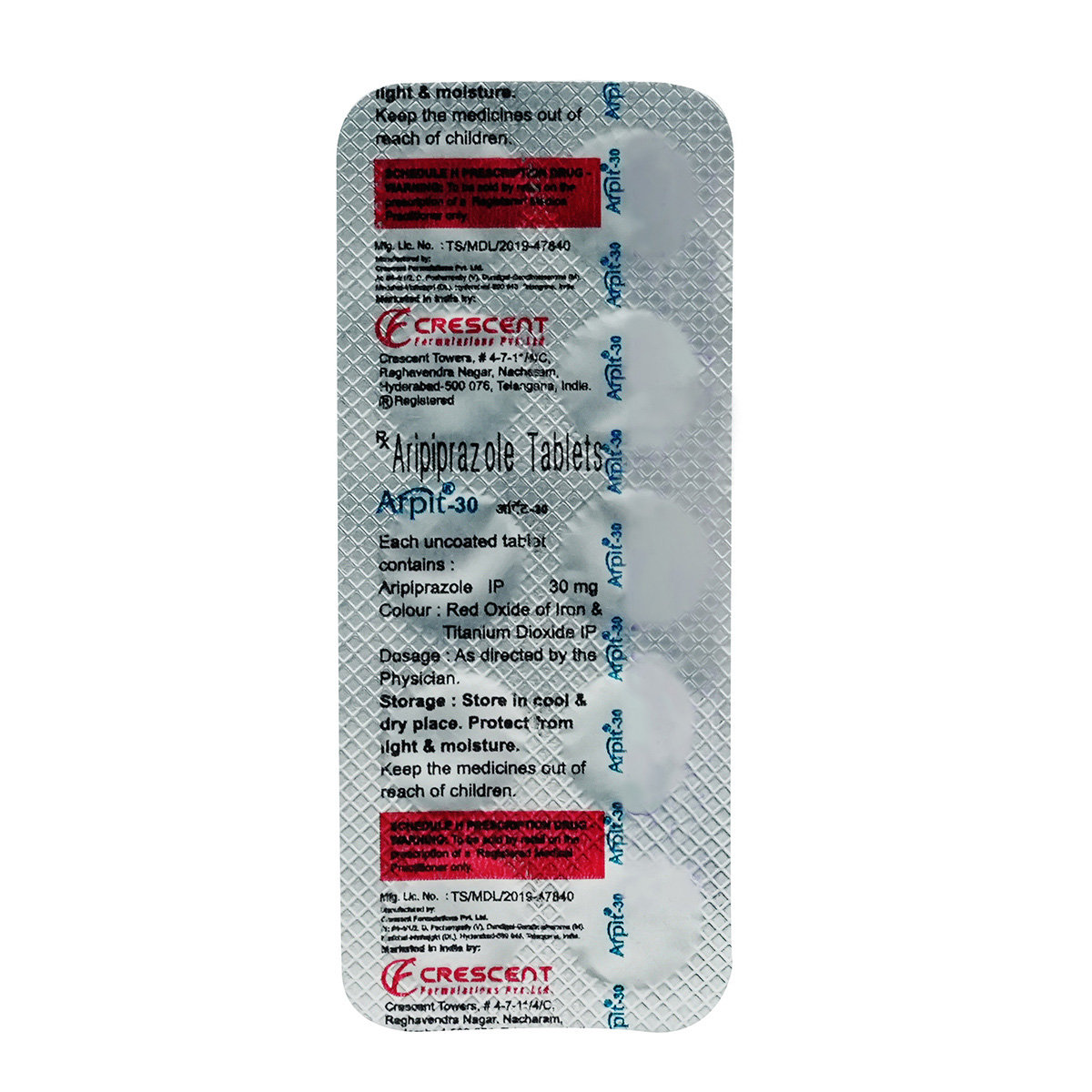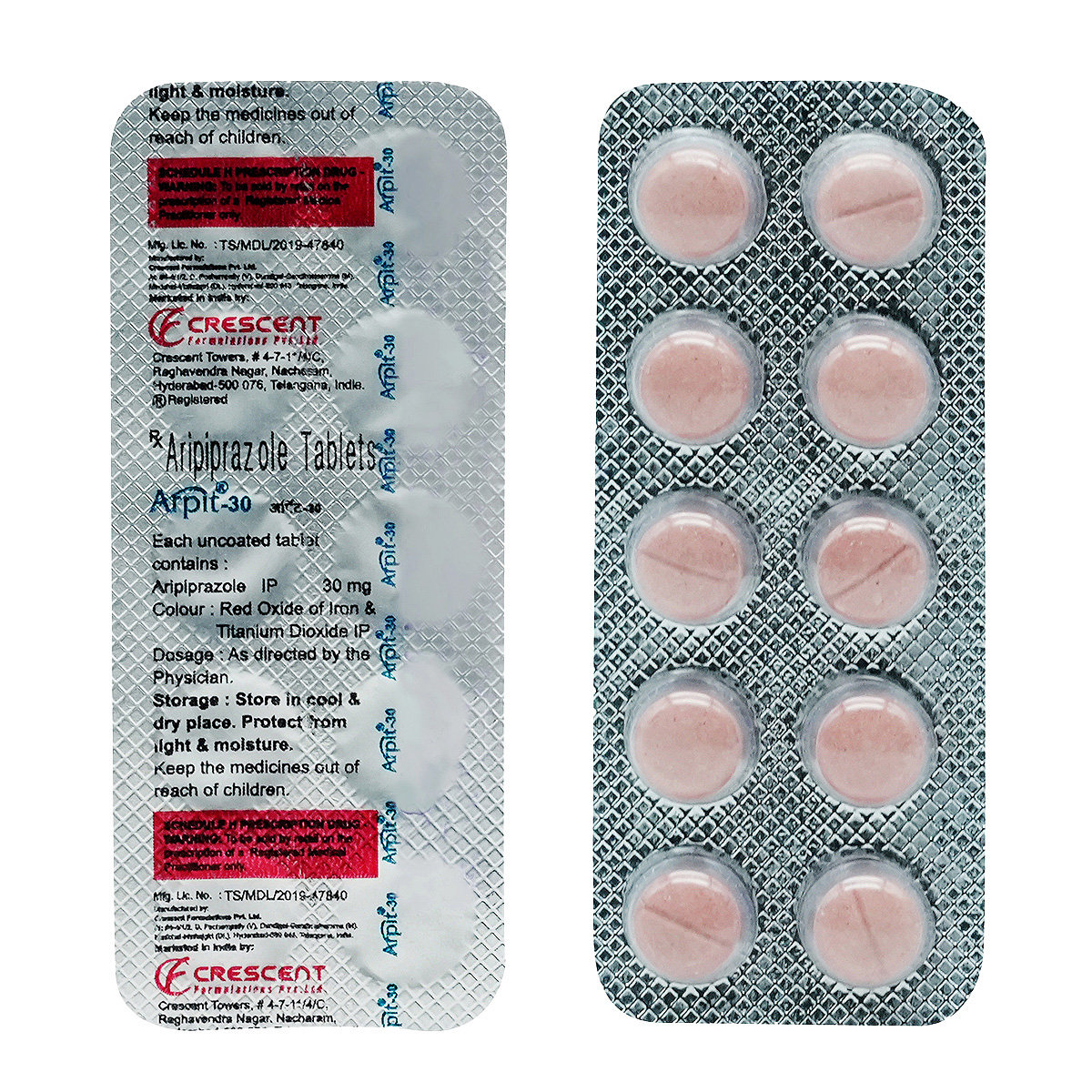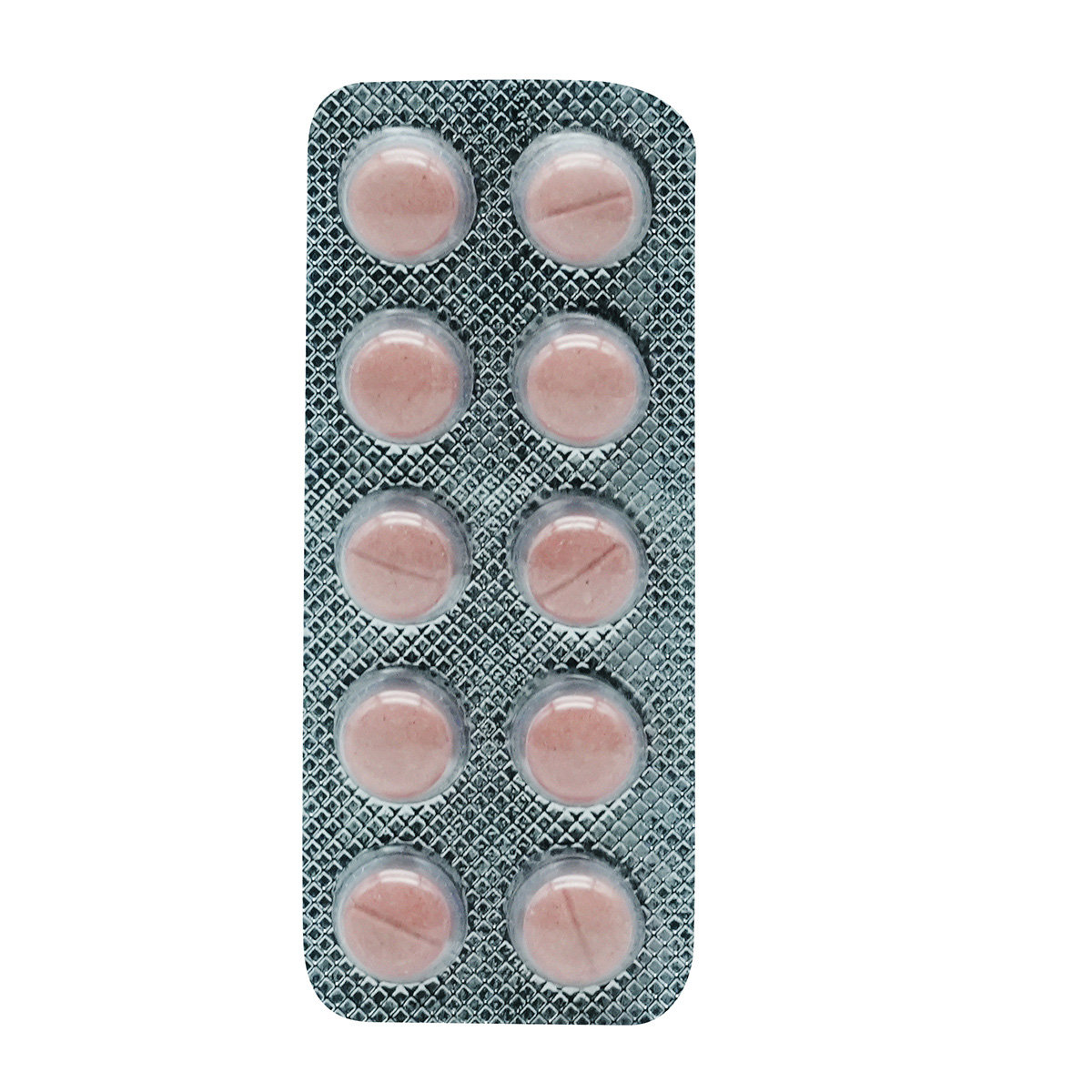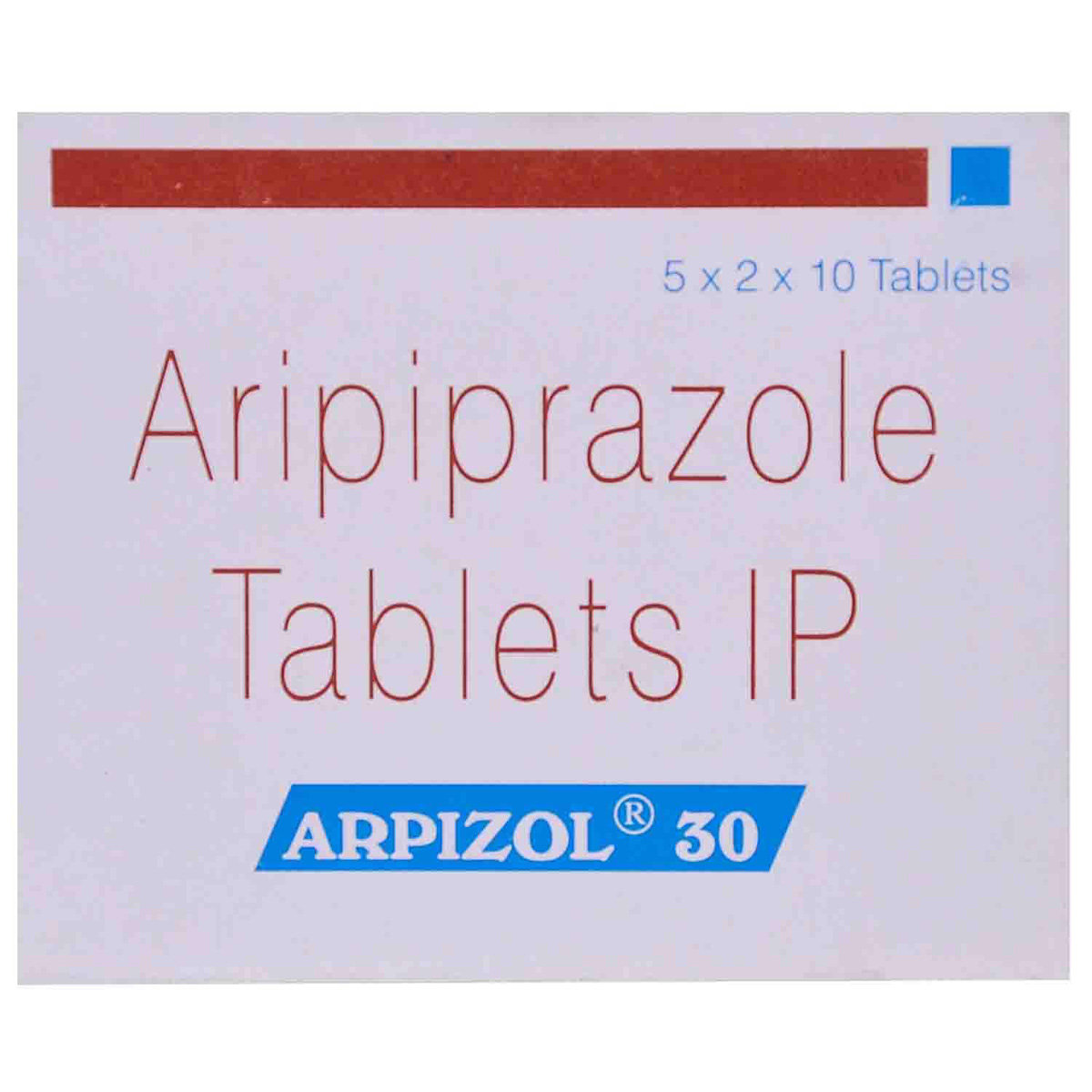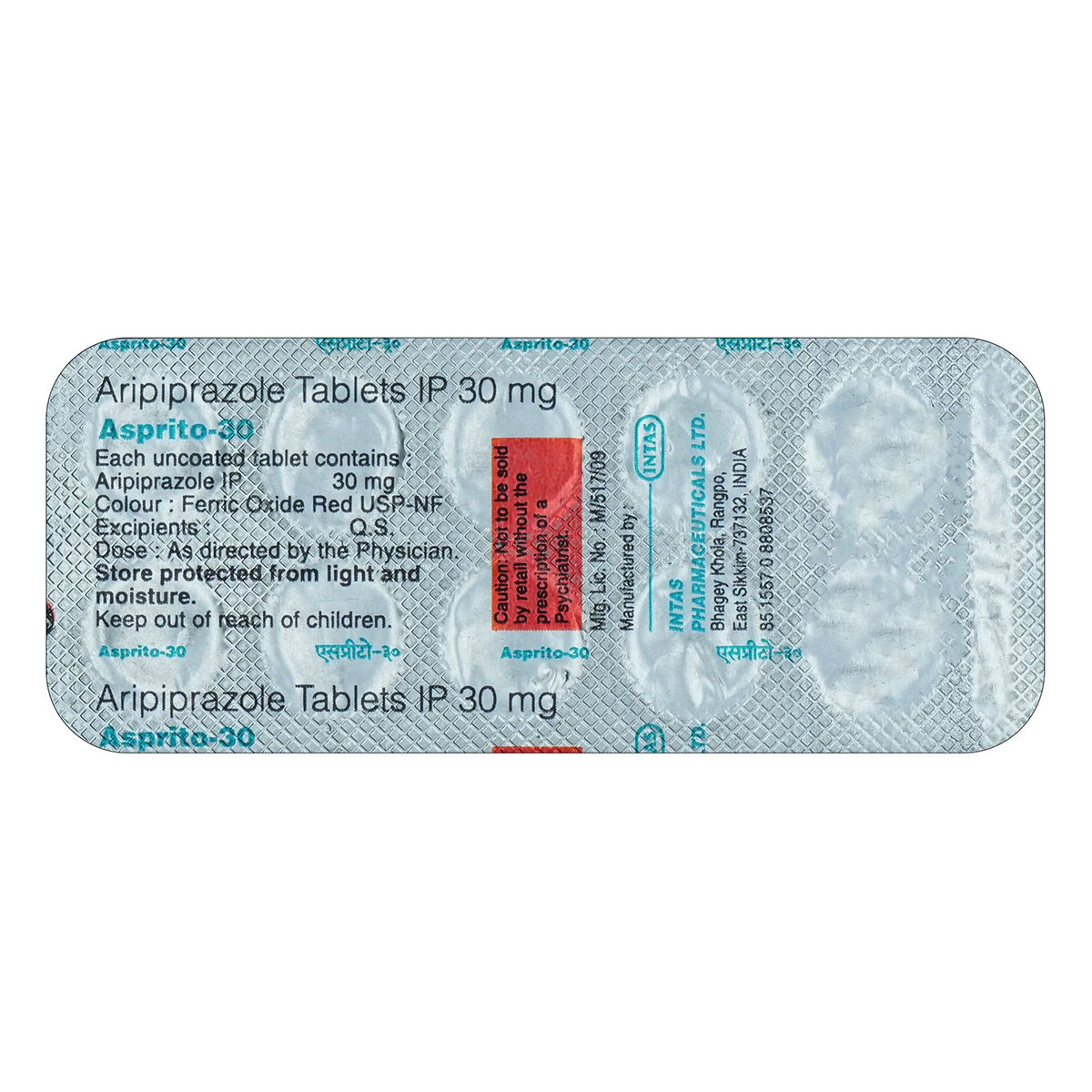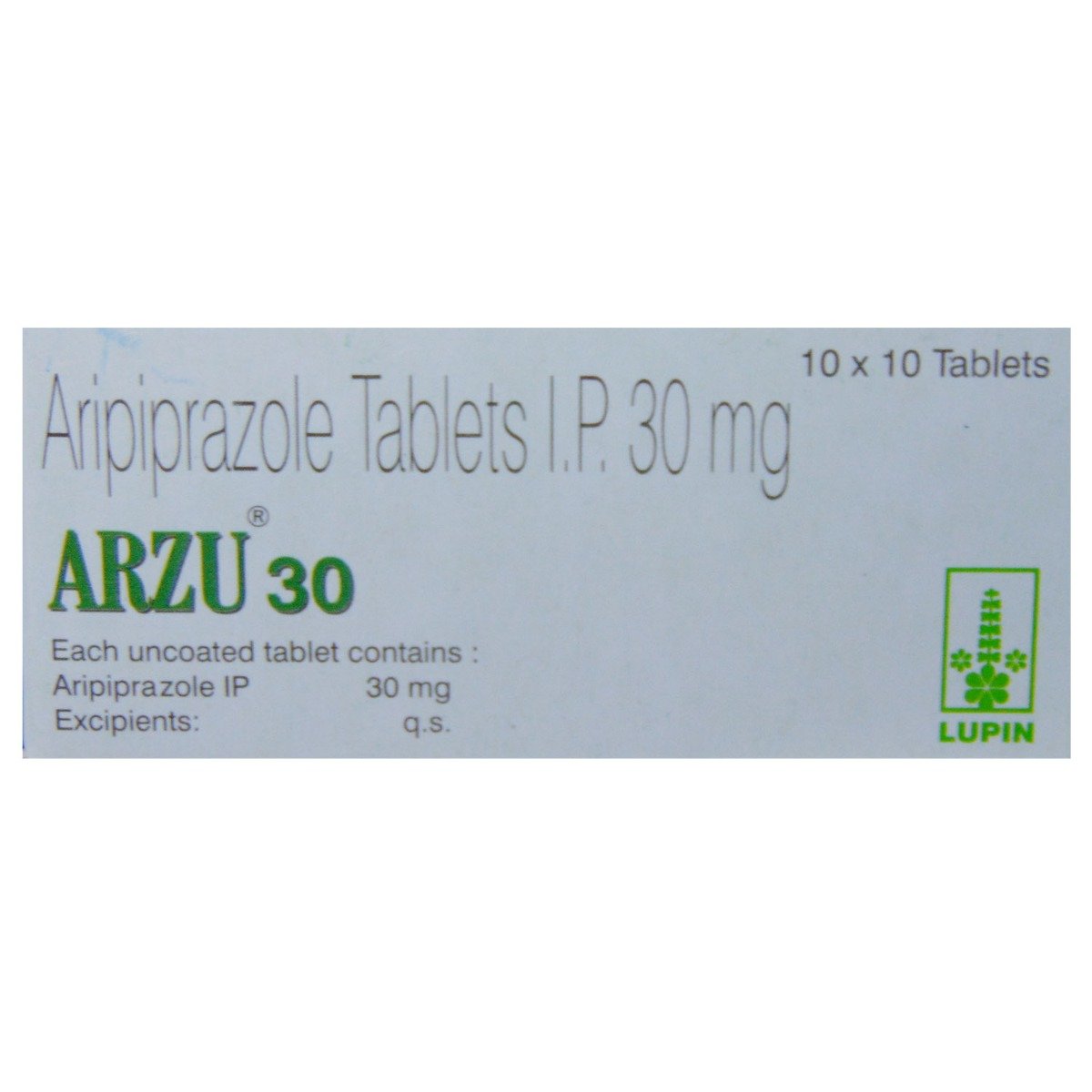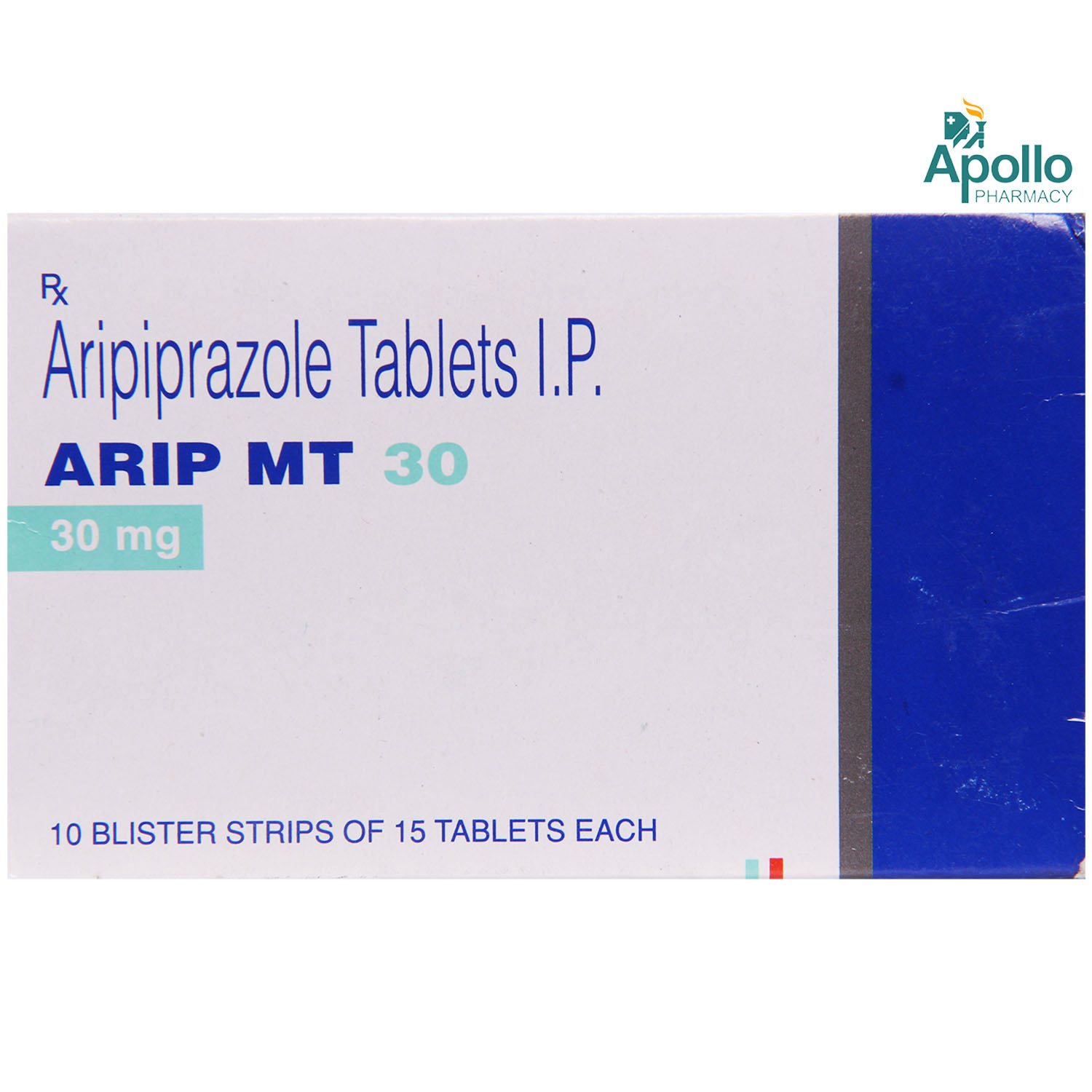Arpit 30 mg Tablet 10's
MRP ₹360
(Inclusive of all Taxes)
₹54.0 Cashback (15%)
Provide Delivery Location
Online payment accepted
 Prescription drug
Prescription drugWhats That
Composition :
Manufacturer/Marketer :
Consume Type :
Expires on or after :
Return Policy :
About Arpit 30 mg Tablet
Arpit 30 mg Tablet belongs to a class of drugs called antipsychotics and mood stabilizers primarily used to treat mood disorders like schizophrenia, irritability linked with autism, and Tourette's syndrome. Besides this, Arpit 30 mg Tablet also helps in managing mental depression along with other antidepressant medicines. Schizophrenia affects the ability of a person to feel, think and behave clearly. Tourette's syndrome is a mental disorder characterized by uncontrollable, repetitive movements or unwanted sounds (tics). Psychosis may be caused due to disturbances in chemical messenger activity known as neurotransmitters (like dopamine and serotonin) in the brain.
Arpit 30 mg Tablet contains Aripiprazole which stabilizes and blocks the dopamine and serotonin receptors in the brain, preventing its overactivity, thereby controlling the positive symptoms like hallucinations, misbelief, and unfriendly characteristics of schizophrenia. Arpit 30 mg Tablet improves the activity of dopamine and serotonin receptors in other areas of the brain. It helps control negative symptoms (like lack of emotion, social isolation, poor attention, and memory loss) of schizophrenia. Thus, Arpit 30 mg Tablet improves mood swings, depression, and other psychotic problems.
Take Arpit 30 mg Tablet as prescribed. Your doctor will advise you how often you take Arpit 30 mg Tablet based on your medical condition. Some people may experience drowsiness, headache, tiredness, akathisia (inability to sit still), difficulty sleeping, light-headedness, indigestion, shaking, blurred vision, nausea, vomiting, anxiety, and increased saliva production. Most of these side effects of Arpit 30 mg Tablet do not require medical attention and gradually resolve over time. However, if the side effects persist or worsen, please consult your doctor.
If you are allergic to Arpit 30 mg Tablet or any other medicines, please tell your doctor. Arpit 30 mg Tablet should be used with caution in elderly patients above 65 years of age. There is an increased risk of adverse reactions such as dizziness, inability to move and balance, orthostatic hypotension (fall in blood pressure when standing up), and drowsiness. Avoid taking Arpit 30 mg Tablet if you are pregnant or breastfeeding and consult a doctor. Arpit 30 mg Tablet is not recommended for children below 15 years of age. If you have any self-harming thoughts or behavior while taking Arpit 30 mg Tablet , please contact a doctor immediately. If you have diabetes, abnormal blood pressure, high cholesterol, fits, involuntary muscle movements especially in the face, attention-deficit hyperactivity disorder (ADHD), blood clots, a history of stroke or heart attack, kidney or liver problems, inform your doctor before taking Arpit 30 mg Tablet .
Uses of Arpit 30 mg Tablet
Directions for Use
Key Benefits
Arpit 30 mg Tablet contains Aripiprazole which helps treat various psychotic conditions like schizophrenia, mood disorders (such as mania and bipolar disorder), and sometimes depression. Arpit 30 mg Tablet inhibits the dopamine receptor in our brain thereby controlling the positive symptoms (like hallucinations, misbelief, and unfriendliness) and negative symptoms (like social isolation, lack of emotion, poor attention, and memory loss) of schizophrenia. Thus, Arpit 30 mg Tablet improves overall behavior and thoughts and helps in having a better social life and comfortably doing daily activities. Arpit 30 mg Tablet may be used in combination with other medicines to treat depression. Additionally, Arpit 30 mg Tablet is also used to reduce unwanted sounds (tics) severity in Tourette's syndrome (a nervous system problem that causes unwanted sounds or sudden movements).
Storage
- Eat fiber-rich foods, fruits, and vegetables, and track your food intake to monitor calorie consumption.
- Limit takeout and restaurant meals, and weigh yourself weekly to stay motivated.
- Build balanced meals, allow yourself to enjoy treats in moderation, and prioritize sleep and stress management through exercise and relaxation techniques.
- Inform your doctor about the nausea and discuss possible alternatives to the medication or adjustments to the dosage.
- Divide your daily food intake into smaller, more frequent meals to reduce nausea.
- Opt for bland, easily digestible foods like crackers, toast, plain rice, bananas, and applesauce.
- Avoid certain foods that can trigger nausea, such as fatty, greasy, spicy, and smelly foods.
- Drink plenty of fluids, such as water, clear broth, or electrolyte-rich beverages like coconut water or sports drinks.
- Use ginger (tea, ale, or candies) to help relieve nausea.
- Get adequate rest and also avoid strenuous activities that can worsen nausea.
- Talk to your doctor about taking anti-nausea medication if your nausea is severe.
- Record when your nausea occurs, what triggers it, and what provides relief to help you identify patterns and manage your symptoms more effectively.
- Preventing Vomiting (Before it Happens)
- Take medication exactly as prescribed by your doctor. This can help minimize side effects, including vomiting.
- Having a small meal before taking your medication can help reduce nausea and vomiting.
- Talk to your doctor about taking anti-nausea medication along with your prescribed medication.
- Managing Vomiting (If it Happens)
- Try taking ginger in the form of tea, ale, or candy to help alleviate nausea and vomiting.
- What to Do if Vomiting Persists
- Consult your doctor if vomiting continues or worsens, consult the doctor for guidance on adjusting your medication or additional treatment.
- Inform your doctor about your constipation symptoms. They may adjust your medication or advise alternative treatments.
- Stay hydrated by drinking sufficient of water (at least 8-10 glasses a day) to help soften stool and promote bowel movements.
- Increase fibre intake by eating foods high in fibre, such as fruits, whole grains, vegetables and legumes, to help bulk up the stool.
- Establish a bowel routine by trying to go to the bathroom at the same time each day to train your bowels.
- Engaging in regular exercise, like walking or yoga, can support in bowel movement stimulation.
- Consult your doctor if constipation persists, and discuss alternative treatments or adjustments to your medication.
- Restlessness is related to mental health and needs medical attention if it's severe.
- Regular practice of meditation and yoga can help calm your mind. This can reduce restlessness.
- Prevent smoking as it can impact your calmness of body and mind.
- Talk to your friends and family about restlessness, who can provide a solution for why you feel restless.
- Get sufficient sleep for a minimum of 6-7 hours to reduce restlessness.
- Stretching and walking are examples of mild exercises that can improve mobility and reduce muscle stiffness.
- Improving posture, mobility, and muscle coordination through physical therapy can help manage slowness or stiffness.
- Maintain healthy weight and advance general health depend on eating a balanced diet.
- Reducing symptoms like tremors or muscle spasms requires adequate sleep and rest.
- Notify your doctor immediately if you experience tremors or involuntary shaking after taking medication or adjusting your medication regimen.
- Your doctor may adjust your medication regimen or recommend alternative techniques like relaxation, meditation, or journaling to alleviate tremor symptoms.
- Your doctor may direct you to practice stress-reducing techniques, such as deep breathing exercises, yoga, or journaling.
- Regular physical activity, such as walking or jogging, can help reduce anxiety and alleviate tremor symptoms.
- Your doctor may recommend lifestyle changes, such as avoiding caffeine, getting enough sleep, and staying hydrated, to help manage tremors.
- Maintain regular follow-up appointments with your doctor to monitor tremor symptoms and adjust treatment plans as needed.
Drug Warnings
If you are allergic to Arpit 30 mg Tablet or any other medicines, please tell your doctor. Arpit 30 mg Tablet should be used with caution in elderly patients above 65 years of age as there is an increased risk of adverse reactions such as dizziness, changes in the ability to move and balance, orthostatic hypotension (fall in blood pressure when standing up), and drowsiness. Avoid taking Arpit 30 mg Tablet if you are pregnant or breastfeeding and consult a doctor. Arpit 30 mg Tablet is not recommended for children below 15 years of age. If you have any self-harming thoughts or behavior while taking Arpit 30 mg Tablet , please contact a doctor immediately. If you develop impulse control disorders such as excessive eating, spending, addictive gambling, or abnormally high sex drive, inform your doctor so that the dose may be adjusted appropriately, or are advised to stop taking Arpit 30 mg Tablet . If you have diabetes, abnormal blood pressure, high cholesterol, fits, involuntary muscle movements especially in the face, attention-deficit hyperactivity disorder (ADHD), blood clots, history of stroke or heart attack, kidney or liver problems, inform your doctor before taking Arpit 30 mg Tablet .
Drug-Drug Interactions
Drug-Drug Interactions
Login/Sign Up
Co-administration of Metoclopramide with Arpit 30 mg Tablet can increase the risk of side effects.
How to manage the interaction:
Taking Arpit 30 mg Tablet with Metoclopramide is generally avoided as it can result in an interaction, it can be taken if a doctor has advised it. Do not discontinue any medications without consulting a doctor.
Using Arpit 30 mg Tablet together with Remifentanil can cause central nervous system depression (a physiological state that can result in a decreased rate of breathing, decreased heart rate, and loss of consciousness).
How to manage the interaction:
There may be a possibility of interaction between Arpit 30 mg Tablet and Remifentanil, but it can be taken if prescribed by a doctor. It's important to keep an eye on your health and talk to a doctor about any concerns. If you notice any symptoms like trouble breathing, feeling sleepy or dizzy, or having trouble focusing, make sure to contact a doctor right away. Do not stop using any medications without talking to a doctor.
Using Arpit 30 mg Tablet together with Pethidine can cause central nervous system depression (a physiological state that can result in a decreased rate of breathing, decreased heart rate, and loss of consciousness).
How to manage the interaction:
Although there is a possible interaction between Pethidine and Arpit 30 mg Tablet, you can take these medicines together if prescribed by a doctor. Consult a doctor if you experience dizziness, drowsiness, difficulty concentrating, impaired judgment, reaction speed, and motor coordination. Do not discontinue any medications without consulting a doctor.
Using Arpit 30 mg Tablet together with Oxycodone can cause central nervous system depression (a physiological state that can result in a decreased rate of breathing, decreased heart rate, and loss of consciousness).
How to manage the interaction:
Taking Arpit 30 mg Tablet with Oxycodone together can result in an interaction, but it can be taken if a doctor has advised it. Do not exceed the doses, frequency, or duration of usage advised by a doctor. Furthermore, because these medications may induce dizziness, sleepiness, trouble focusing, and impairment in judgement, response speed, and motor coordination, you should avoid driving or operating dangerous machinery. Do not stop using any medications without a doctor's advice.
Combining Arpit 30 mg Tablet with Mirabegron can increase the levels of Arpit 30 mg Tablet in the body. This can lead to increased risk or severity of side effects.
How to manage the interaction:
Although taking Mirabegron and Arpit 30 mg Tablet together can cause an interaction, it can be taken if a doctor has suggested it. If you notice any of these signs like feeling sleepy, having seizures, unusual muscle movements, low blood pressure, feeling confused, muscle spasms, twitching in your jaw, shaking or jerking in your arms and legs, feeling nervous or restless, dizziness, lightheaded, or fainting contact the doctor right away. Do not stop using any medications without a doctor's advice.
Using Morphine together with Arpit 30 mg Tablet can cause central nervous system depression (a physiological state that can result in a decreased rate of breathing, decreased heart rate, and loss of consciousness).
How to manage the interaction:
Taking Morphine with Arpit 30 mg Tablet can result in an interaction, but it can be taken if a doctor has advised it. However, if you experience any symptoms like trouble breathing, feeling tired, or having a cough, dizziness, drowsiness, difficulty concentrating, impaired judgment, reaction speed, and motor coordination, make sure to contact a doctor immediately. Use caution while getting up from a sitting or sleeping position and avoid driving or using dangerous machinery. Do not stop using any medications without consulting a doctor.
Using Tapentadol together with Arpit 30 mg Tablet can increase the risk or severity of side effects like decreased breathing rate, irregular heart rhythms, or problems with movement and memory.
How to manage the interaction:
Taking Arpit 30 mg Tablet with Tapentadol can result in an interaction, it can be taken if a doctor has advised it. Contact a doctor immediately if you experience drowsiness, lightheadedness, palpitations, confusion, severe weakness, or difficulty breathing. Do not exceed the doses, frequency, or duration of usage advised by a doctor. Furthermore, because these medications may induce dizziness, sleepiness, trouble focusing, and impairment in judgement, response speed, and motor coordination, you should avoid driving or operating dangerous machinery. Do not discontinue any medications without consulting a doctor.
Coadministration of Arpit 30 mg Tablet and Metrizamide may increase the risk of seizure (a sudden, violent, uncontrollable contraction of a group of muscles).
How to manage the interaction:
Although taking Arpit 30 mg Tablet and Metrizamide together can cause an interaction, it can be taken if a doctor has suggested it. If you have seizures or a head injury, it's important to contact a doctor right away. Don't hesitate to reach out if you're experiencing any of these symptoms. Do not discontinue any medications without consulting a doctor.
Using Arpit 30 mg Tablet together with Hydrocodone can cause central nervous system depression (a physiological state that can result in a decreased rate of breathing, decreased heart rate, and loss of consciousness).
How to manage the interaction:
Although taking Arpit 30 mg Tablet and Hydrocodone together can cause an interaction, it can be taken if a doctor has suggested it. If you have any of these symptoms like trouble breathing, feeling very sleepy, or having trouble focusing, it's important to call a doctor right away. Do not stop using any medications without talking to a doctor.
Coadministration of Rifapentine may significantly reduce the blood levels of Arpit 30 mg Tablet, which may make the medication less effective in treating the condition.
How to manage the interaction:
There may be a possibility of interaction between Arpit 30 mg Tablet and Rifapentine, but it can be taken if prescribed by a doctor. If you have any unusual symptoms, it's important to let a doctor know. Do not stop using any medications without talking to a doctor.
Drug-Food Interactions
Drug-Food Interactions
Login/Sign Up
Diet & Lifestyle Advise
- Limit the intake of caffeine as it may reduce the effectiveness of Arpit 30 mg Tablet .
- Eat plenty of fruits and vegetables. Eat more fish, especially oily fish such as salmon, sardines, trout, mackerel, pilchards and herring.
- Cut down sugars, salt and saturated fats.
- Drink adequate water to keep the body hydrated.
- Do regular exercise and maintain a stable weight as Arpit 30 mg Tablet may cause weight gain.
- Avoid consumption of alcohol as it may increase drowsiness.
Side Effects of Arpit 30 mg Tablet
- Drowsiness
- Headache
- Tiredness
- Akathisia (inability to sit still)
- Difficulty in sleeping
- Light-headedness
- Indigestion
- Shaking
- Blurred vision
- Nausea
- Vomiting
- Anxiety
- Increased saliva production
Habit Forming
Therapeutic Class
All Substitutes & Brand Comparisons
RX
Out of StockElrip 30mg Tablet
₹137
(₹12.33 per unit)
61% CHEAPERRX
Out of StockAerotak 30mg Tablet
₹139
(₹12.51 per unit)
61% CHEAPERRX
Out of StockARIPICAD 30MG TABLET
Cadila Healthcare Ltd
₹147.15
(₹13.24 per unit)
59% CHEAPER
Author Details
We provide you with authentic, trustworthy and relevant information
Drug-Diseases Interactions
Drug-Diseases Interactions
Login/Sign Up
FAQs
Drug-Drug Interactions Checker List
- METOPROLOL
- OLANZAPINE
- FLUOXETINE
- PAROXETINE
- VENLAFAXINE
- ITRACONAZOLE
- KETOCONAZOLE
- AMIODARONE
- FLECAINIDE
- QUINIDINE
- NEVIRAPINE
- EFAVIRENZ
- INDINAVIR
- RITONAVIR
- IBUPROFEN
- RIFAMPICIN
- RIFABUTIN
- PHENYTOIN
- CARBAMAZEPINE
- PHENOBARBITAL
Special Advise
- Elderly patients more than 65 years with dementia-related psychosis treated with Arpit 30 mg Tablet can be at an increased risk of death.
- Arpit 30 mg Tablet is not prescribed and approved for the treatment of dementia-related psychosis.
- Increased risk of suicidal thinking and behavior changes has been observed in children, adolescents, and young adults taking Arpit 30 mg Tablet , so close monitoring for worsening and the emergence of suicidal thoughts and behaviours is required.
Disease/Condition Glossary
Schizophrenia: It is a mental disorder that affects a person's ability to feel, think and behave clearly. Mania is a mental condition that causes intense excitement, high energy, and delusions (misbeliefs). Mania may occur due to lack of sleep or sleep pattern changes, high levels of stress, and alcohol intake. Seek medical help immediately if you have any self-harming or suicidal thoughts.
Bipolar disorder: It is also called manic depression, associated with extreme mood swings ranging from manic highs to depressive lows. The symptoms of bipolar disorder include mania (high energy and excitability) and depression (loss of interest, hopelessness, low energy). Bipolar disorder involves lifelong treatment.
Depression: It is a mental condition characterized by low mood and a loss of interest in activities. People affected by this condition are often unsocial and try to keep isolated from other social activities.

Have a query?
Alcohol
Safe if prescribed
You are recommended to avoid alcohol consumption with Arpit 30 mg Tablet as it may increase the risk of side effects such as dizziness, drowsiness or difficulty in concentrating.
Pregnancy
Consult your doctor
Arpit 30 mg Tablet is a Category C pregnancy drug and is not recommended for use during pregnancy, especially in the third trimester as it may cause adverse effects in the newborn baby. Arpit 30 mg Tablet may cause extrapyramidal and/or withdrawal symptoms in newborn babies with third-trimester exposure.
Breast Feeding
Consult your doctor
Avoid breastfeeding while taking Arpit 30 mg Tablet as it may be excreted in breast milk and cause adverse effects in the baby.
Driving
Safe if prescribed
Arpit 30 mg Tablet may cause dizziness or vision problems such as blurred vision. Therefore, avoid driving if you feel dizzy or have vision disturbances after taking Arpit 30 mg Tablet .
Liver
Consult your doctor
Take Arpit 30 mg Tablet with caution, especially if you have a history of Liver diseases/conditions. The dose may be adjusted by your doctor as required.
Kidney
Consult your doctor
Take Arpit 30 mg Tablet with caution, especially if you have a history of Kidney diseases/conditions. The dose may be adjusted by your doctor as required.
Children
Safe if prescribed
Arpit 30 mg Tablet is not recommended for children below 15 years due to the increased risk of adverse effects. However, please consult a doctor before giving Arpit 30 mg Tablet to children.

